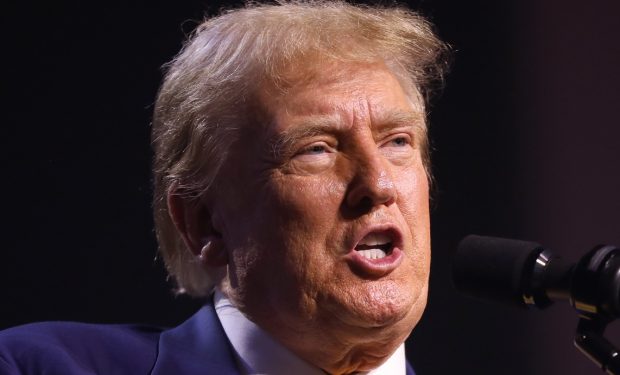Special Counsel Jack Smith‘s complex election interference legal case against Donald Trump got more corroborating material yesterday, straight from the mouth of the Defendant.
The case, which already cites hundreds of Trump’s own statements on social media and elsewhere, can now add an instance of the former President claiming solidarity with the January 6 rioters, using the first-person plural pronoun “we” to imply that he and the rioters represented one side, acting against “the others” on the other side.
Smith has shown in his filings that what Trump says and writes is a significant part of the evidence against him. It follows that Smith’s notebook has a new page today, quoting Trump’s Univision Q&A yesterday.
Talking of January 6, Trump said: “There were no guns down there. We didn’t have guns, the others had guns but we didn’t have guns.” Seeming to catch himself, Trump tried to refine his definition of “we,” but offered little clarity, saying, “When I say ‘we’ these are people that walked down. This was a tiny percentage of the overall which nobody sees.”
(Hearing Trump claim solidarity with the rioters, the Kamala Harris campaign clipped and shared the segment on X and elsewhere.)
Trump refers to violent January 6 insurrectionists as “we” multiple times
— Kamala HQ (@KamalaHQ) October 17, 2024
“We didn’t have guns”
“I say we” pic.twitter.com/TpfEn4sCb4
[NOTE: Trump’s own statements remain integral to Smith’s prosecution. Describing Trump’s “steady stream of disinformation” in his most recent filing, Smith references “more than 1,200 tweets” Trump sent during the post-election period, most of which concerned the 2020 election.]
Despite few reminders in the media about it, Trump still faces charges in federal court for inciting an insurrection on the Capitol and trying to steal the 2020 election.
As a presidential candidate, Trump has practiced an audacious level of historical revisionism when it comes to the events of January 6. He has repeatedly said it was a “peaceful” day — despite the violence captured on camera — and yesterday Trump claimed January 6 was a “day of love.”
Yet despite Trump’s unaccountably rosy view of the events, and his impeachment for his role in inciting the rioters, Trump has maintained some distance between himself and the actions of the crowd that day, which marched on the Capitol and threatened to hang the Vice President after attending Trump’s speech.
Walking a tenuous line, Trump has denied inciting the riot and also claimed that he appreciates the rioters, calling them “patriots.”
He has been introduced at rallies with a version of the National Anthem sung by Jan 6 convicts, and he has said he will pardon — if he gets the chance — the 1000+ people convicted for their January 6 crimes (many of whom confessed).
But with these promises and words of appreciation, he has largely avoided a direct connection with the rioters’ actions that day — making his use of “we” yesterday a rarity.
While Smith’s case against Trump doesn’t rely on his role in the riot, January 6 does play a significant part in the machinations Trump and MAGA allegedly attempted in order to destabilize the government and deny Joe Biden his election victory — according to the DOJ.
Smith’s efforts to link Trump to the insurrection may be more tangible now. MAGA protests about Trump’s statements, however, don’t credit the linkage, saying Trump meant something else by “we.”
Trump refers to violent January 6 insurrectionists as “we” multiple times
— Kamala HQ (@KamalaHQ) October 17, 2024
“We didn’t have guns”
“I say we” pic.twitter.com/TpfEn4sCb4
